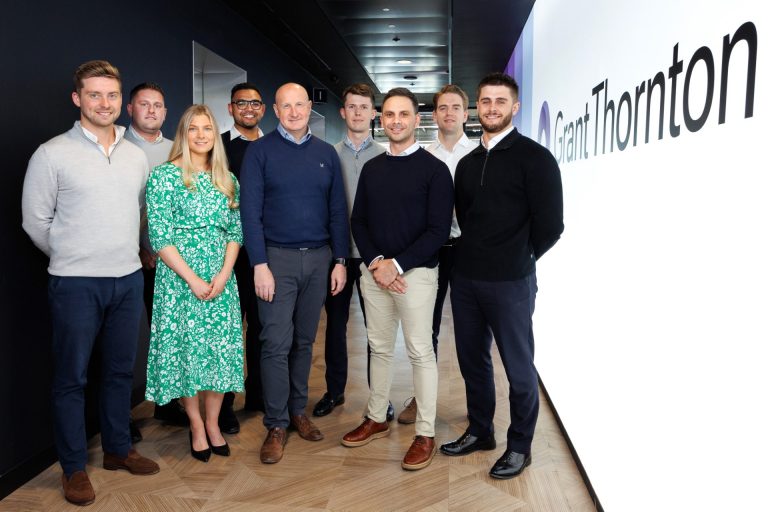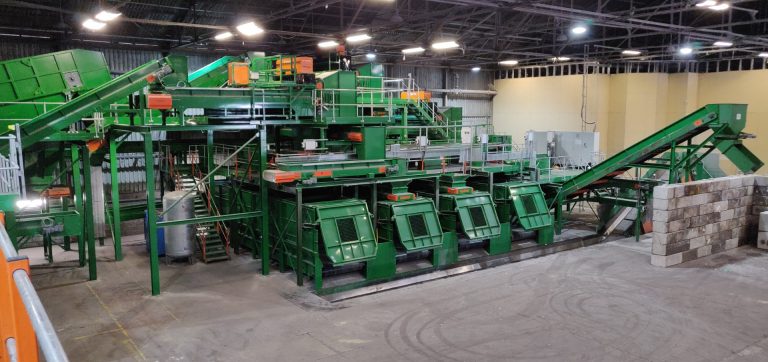Raft of promotions and appointments as Grant Thornton’s Midlands Corporate Finance team sees strong growth
Nottingham City Councillors meet to consider Section 114 Report
Engineering firm targets carbon neutrality with £1.3m investment
An East Midlands manufacturer is driving sustainable growth, supported by a £1.3 million investment from Lloyds Bank.
Headquartered in Desborough, Northamptonshire, OKAY Engineering designs and manufactures high performance recycling equipment and waste handling technology. This includes providing local authorities with the technology to separate the mixed recycling it collects from homes, as well as providing recycling equipment for manufacturers and commercial organisations processing waste materials.
OKAY plans to become fully carbon neutral within 10 years. Thanks to £187,000 of funding, the £9 million turnover business has just boosted its green credentials by installing 425 solar panels on its factory roof.
The 200MWh system now provides two thirds of the company’s energy demand, reducing energy bills by £1m over the panels’ 25-year lifetime. The new measures will also save 40 tonnes of CO2 production each year, the equivalent of planting 1,728 trees.
The solar panels have been funded via Lloyds Bank’s Clean Growth Financing Initiative, which provides customers with access to discounted lending for green purposes.
Earlier in the year, Lloyds Bank also invested £1.14 million to help OKAY purchase three acres of brownfield land behind its current factory.
The plan is to use one acre of the adjacent site to build a second factory to serve demand from the rapidly growing recycling industry, and the remaining two acres is earmarked for a solar farm so the company can become entirely energy self-sufficient, as well as create a second income stream selling its surplus renewable energy.
The company’s expansion and investment plans also include the team of 50 at OKAY learning new skills to automate its production lines and introduce AI.
The business has also switched 30% of its vehicles to electric vehicles, installing two charging stations onsite, and it is also upgrading its manufacturing equipment to more energy efficient models. This is all part of its aims to become carbon neutral within the next ten years.
In addition to the funding from Lloyds Bank, OKAY Engineering has taken advantage of the government’s research and development (R&D) tax relief scheme, which allows SMEs to claim Corporation Tax relief for investing in innovation. It’s also working to boost the diversity of its workforce with the launch of its own apprenticeship scheme, through which it hopes to attract more young people and women into the business and the sector.
Antonia Kay, Managing Director of OKAY Engineering, said: “The recycling industry and circular economy are becoming increasingly vital sector for the UK as we work to achieve Net Zero. OKAY is an integral part of this transition, with both the knowhow and the UK production capabilities to deliver high performance recycling technology.
“We have experience in handling of all types of waste and, as a British manufacturer, we are looking to deploy our high performance recycling equipment in ever more applications. We have big investment plans that will ultimately help drive the UK’s recycling figures to where they need to be. We’re grateful to have Lloyds Bank by our side as a trusted partner to support us with our long-term strategy.
“As a business that innovates green technology, it’s essential for us to prioritise sustainability in all our operations. The funding from Lloyds Bank has enabled us to invest in a solution that won’t only reduce our bills, but also reduce our impact on the environment. The solar panels deliver a clear financial and carbon payback, and they help make us the partner of choice for our customers.”
Richard Fear, relationship manager at Lloyds Bank, said: “As well as supporting OKAY with the investment it needs to achieve its goals, we’re also proud to see the business taking advantage of the government’s R&D tax credits, which has given a valuable boost to OKAY and to the UK’s manufacturing sector more widely.
“The business’s inclusive skills strategy also aligns closely with our commitment to supporting the development of a diverse talent pipeline in vital sectors such as manufacturing, and we’re proud that our funding is enabling this local business to contribute to the community and the future of the sector.”
2024 Business Predictions: Marc Abrams, senior office partner at KPMG UK’s Nottingham office
East Midlands unemployment rate remains among lowest in UK but technical skills shortages continue
New funding programme to accelerate healthcare innovation in the East Midlands
Generation Next chair and vice-chair revealed for 2024
Nottingham City Council faces £50m budget gap next year
- Review Library Service provision whilst maintaining a comprehensive and efficient service offer appropriate to the needs of citizens
- Removing the council contribution towards Area Based Grants to the voluntary and charity sector and grants to arts organisations and cultural sector
- Deletion of both the Community Protection and Resident Development service areas with approximately 20 FTE posts moved to Regulatory Services to delivery statutory duties relating to environmental enforcement and antisocial behaviour
- Reviewing the operation of community centres and seek to remove council subsidised grants
- Reduce public transport infrastructure to minimum statutory provision including the removal of funding to operate two bus-based park and ride sites, Victoria Bus Station and the real time passenger information system
- Reduce all linkbus services to statutory minimum provision, remove Easylink and withdraw funding contribution to the Medilink service
- Moving to the minimum statutory provision of Concessionary Fares for which would remove the concession from the tram and companion pass holders and funding for managing the Robin Hood Scheme
- Re-structure and reduce tiers and overall capacity in Adult Social Care Assessment function
- Closure of Colwick Park Activity Centre
- Ending school uniform support for eligible families if the Household Support Fund grant does not continue
- A reduction in council staffing levels of over 500 full-time equivalent posts. Every effort will be made to limit compulsory redundancies through targeted voluntary redundancy
- A proposed Council Tax increase of 4.99% which includes the 2% Adult Social Care precept permitted by the Government
Profitable results praised at Image Scan
Image Scan’s CEO is “pleased” by the X-ray screening systems supplier’s profitable results.
According to preliminary results for the year ended 30 September 2023, sales at the firm were up 50% to £3m. Meanwhile the company posted a pre-tax profit £0.1m, improving from a £0.35m loss in the year prior.
This performance “was the result of a strong recovery in sales and good cost control,” the business noted.Image Scan’s Chief Executive, Vince Deery, said: “I’m very pleased by our results, a testament to the team’s tireless efforts for a profitable year. New products and an optimised cost base significantly contributed to this turnaround.
“Our extended portable product range for the security market gained traction, resulting in a substantial uplift in sales compared to the previous year. With a robust operational and financial foundation, we look forward to the coming year, aiming for organic growth and strategic development.
“My sincere thanks to the team for their commitment in propelling us into profitability.”
Further drop in East Midlands new orders as employment falls at quicker rate
The headline NatWest East Midlands PMI® Business Activity Index – a seasonally adjusted index that measures the month-on-month change in the combined output of the region’s manufacturing and service sectors – posted 47.1 in November, down slightly from 47.5 in October.
The latest data signalled a solid drop in output, thereby extending the current sequence of contraction that began in August. Companies in the East Midlands noted that the decline was due to weak client demand, with some reports of order cancellations and postponements. Of the 12 monitored UK regions, only the North East recorded a steeper drop in activity.
East Midlands firms registered a fifth successive monthly decrease in new business during November. The rate of contraction eased slightly but remained strong overall. Anecdotal evidence suggested the drop in new orders was due to weak client confidence and lower customer purchasing power. The East Midlands indicated the sharpest fall in new orders of the 12 monitored UK regions.
Business confidence in the East Midlands slipped to the lowest since December 2022 in November. The level of positive sentiment was weaker than the UK average and was historically subdued with regards to the region’s long-run series trend. Although optimism was driven by hopes of a pick up in client demand and investment in new products, high interest rates and subdued demand conditions reportedly weighed on confidence.
November data indicated a further contraction in staffing numbers at East Midlands firms. The rate of job shedding quickened slightly and was the second-fastest since January 2021. Moreover, of the 12 monitored UK areas, only Wales and the North East signalled stronger contractions in employment.
The decrease in workforce numbers was linked to lower new order inflows and cost cutting initiatives.
Private sector firms in the East Midlands recorded a solid drop in incomplete business midway through the fourth quarter. Companies noted that lower levels of unfinished business were linked to a further reduction in new orders and sufficient capacity to process incoming work.
Backlogs of work fell for the fourteenth successive month, but at the weakest rate since July.
East Midlands firms recorded a pick up in the rate of cost inflation during November, as the pace of increase quickened from October’s recent low. That said, cost burdens rose at the second-slowest pace in almost three years amid lower prices for some raw materials. Nonetheless, the rate of inflation was broadly in line with the UK average.
The increase was led by the service sector, as manufacturing costs were broadly unchanged.
Companies in the East Midlands increased their output charges at a sharp pace during November. The rate of inflation eased slightly to the slowest in three months and was marginally weaker than that seen across the UK as a whole, but remained above the region’s series average. Firms attributed higher selling prices to efforts to pass-through greater costs to customers.
Rashel Chowdhury, NatWest Midlands and East Regional Board, said: “East Midlands firms saw further drops in output and new orders during November, as the region heads for a challenging end to 2023. The contraction in new business was the strongest of the 12 monitored UK regions, as companies struggled to spur demand, with total activity also suffering.
“Underlying data highlighted further anticipated difficulties over the coming months, as firms cut workforce numbers again and business confidence slumped to the lowest in 2023 to date. Lower employment stemmed from cost cutting efforts, as input prices increased again.
“Although much slower than the average over the last two years, the rate of cost inflation quickened. Meanwhile, a trade-off between protecting margins and passing costs on to clients led to only a fractional moderation in charge inflation. Further historically elevated hikes in selling prices suggest pressure on customer purchasing power will remain a key theme in the coming months.”












